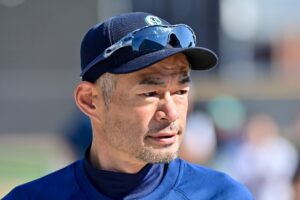
It seems like only yesterday I was extolling the virtues of five of the 10 terrific players whose names I checked on my 2026 Hall of Fame ballot.
That’s probably because it was yesterday, and I explained those choices in individual capsules that take up a lot of space, which gave me an excuse to turn my ballot mea culpa into a three-part series that will mercifully end after I explain in Part 3 why I didn’t vote for a few players who I feel have Hall-worthy numbers.
If you didn’t see the first installment, I chose Carlos Beltrán, Félix Hernández, Andruw Jones, Dustin Pedroia and Andy Pettitte, listing them in alphabetical order instead of ranking them qualitatively, which is probably because I went to Catholic elementary school.
Go read it now. I’ll still be here when you get back. Otherwise, here are the other five:
Francisco Rodríguez
It’s fairly apparent that KRod, as he was affectionately known when he was one of the most dominant relievers in the game during the 2000s, isn’t likely to garner enough support from the eligible Baseball Writers of America Association voters who get the first opportunity to send deserving players to Cooperstown. He only got 30 votes in his second year of eligibility last year, which works out to 7.8 percent of ballots cast. I was one of those 30 last year because he was truly a phenomenon in his prime and he has the most career saves (437) of any retired player not already inducted. Even though Mariano Rivera recently became the first-ever unanimous selection, I believe that relievers have been historically under-represented in the Hall, and hope that Billy Wagner continues to help change that this year. More on that below.
CC Sabathia
The 19-year veteran who was one of baseball’s most consistent winners while splitting his career between Cleveland and the New York Yankees (with a brief stop in Milwaukee in between) is one of three players on the ballot who figure to reach the 75 percent threshold for induction next July. He was a six-time All-Star and 2007 Cy Young Award winner who won 251 regular-season games, 10 postseason games and ranked among the top five Cy Young vote-getters five times. He was a tremendous workhorse, both literally and figuratively, and I believe he deserves to be a first-ballot guy.
Ichiro Suzuki
If Ichiro is not a slam dunk in his first year on the ballot it will be an international incident. Hard to believe that he didn’t arrive in the major leagues until he was 27 years old and still was able to accumulate more than 3,000 hits. That should be reason enough to induct him this year but consider that he had 242 hits in his first big-league season and went on to have more than 200 hits in each of his first 10 seasons playing in the United States. I know it’s not really relevant here, but combined with his impressive career in Japan, he totaled 4,367 hits – 111 more than all-time MLB hits leader Pete Rose. I would never have bet on that.
Billy Wagner
Reliever Billy Wagner saved more games than any left-hander except John Franco, which provides an interesting piece of evidence to support my contention that relievers have historically been under-served in the Hall of Fame, which isn’t exactly breaking news anyway. Wagner had 422 saves and Franco had 424 over the course of intersecting careers. Wagner’s ERA was a half-run better, his 0.998 career WHIP was far more impressive, and he pitched in five fewer seasons. He definitely is more deserving, but that still doesn’t fully explain why Wagner is likely to be elected to the Hall in his final year on the ballot after narrowly missing last year (he was named on 73.8 percent of the ballots), and Franco fell off the ballot after getting only 4.7 percent of the vote in his first year of eligibility in 2011 even though he ranked third overall behind Lee Smith and Trevor Hoffman in career saves at the time of his retirement.
Bonus Franco info: He was also unlucky. In his first and last year of eligibility, there were 13 eventual Hall of Famers on the ballot.
David Wright
The popular Mets star was named on only 6.2 percent of last year’s HOF ballots to narrowly avoid falling below the five percent requirement to remain eligible for election. I voted for him because I hope he gets enough support to stick around for a while after an injury-shortened career during which he might have risen to legitimate Hall of Fame status under better circumstances. He only played 10 full seasons over the course of a 14-year career and generated an excellent slash line – .296/.376/.491/.867 – that produced 244 homers and 970 RBIs. He was just 31 when he went into a four-year injury-fueled tailspin.
Next up: I’ll explain why I chose not to vote for a couple of guys with slam-dunk numbers and a few others who I wish I could have made room for on my ballot.